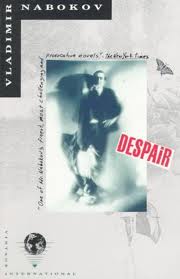Nabokov, Vladimir (1989) Despair. New York: Vintage.
Nabokov wrote this little doppelganger mystery in the 1930’s then revised it in English in the 1960’s. The first two thirds are very slow going, as the pompous, self-aware, first-person narrator pretends to be keeping a diary documenting the writing of his new novel, while also telling the story the novel is about. So right away we are immersed in a fun-house hall of mirrors.
The narrator and main character, Hermann, is a middle-aged Russian immigrant living in Berlin in the 1930’s. He is arch, unreliable, probably waxes his moustache, and indulges in plenty of postmodern metanarrative games, such as “Oh wait a minute, I can’t tell you that detail because I can’t find the receipt. Just a minute. Okay, I’m back. It had fallen to the floor.” I’m sure that sort of thing was innovative in the 1930’s, but it has not aged well. Today it has the sound of college freshman writing.
We are supposed to admire the narrator’s wit, erudition, and snarky remarks about all the other characters, but his comments can just as easily seem boorish and boring. The language is elevated and sophisticated however, and there are some clever cultural references (although dated: sly remarks about Bolsheviks, for example), but since any plausible context is lacking, the clever language amounts to unsustainable drivel. That’s what makes the first part of the book a slog.
While on a country walk, Hermann, the narrator/diarist/novelist, encounters a tramp who he believes looks just like him, his literal doppelganger. We grant the author this conceit at first, but soon it becomes doubtful if the two men really are alike, and we slowly come to realize that Hermann is a Narcissus who would be thrilled to have the universe mirror his face to him, like any novel writer, get it? This inference of Hermann’s frailty is supported by his novelistic efforts and his comments on them, which are ludicrously naïve and self-centered. So we understand that he is highly eccentric, if not mentally abnormal (again, like anyone must be, who would attempt to write a novel). I emphasize that all this takes 70 pages of almost intolerable triviality to form into a clear theme.
Hermann forms a plan to kill the double, have his wife collect the insurance on his own life, then retire. At least this last third of the book has a traditional plot line, however lame. It turns out, the plot is just as unreliable as Hermann himself, for it quickly emerges that the murder scheme is really a metaphor for the perfect novel Hermann believes he is writing, the novel we are reading. The novel will be a “killer,” as it were. But since it is plain that what we are reading is poor quality for a mystery novel, we realize that the murder plan is flawed. The investigative police then stand for literary critics, the flaw in the plan is the flaw in the book, the criminal/writer denies culpability, claims to have been misunderstood, flees the criticism, but finally must confess to artistic failure.
The whole novel should be read a second time after one is fully aware of its metanarrative intent. However, I never read a novel a second time. Life is too short — my life is too short. I feel that a work of art only gets one shot at me. Does this novel miss? Not quite. There were plenty of clues to the self-referential theme in the early part, and it was all made clear in the last part, so I “got” the message, the joke, the point. But I was underwhelmed. The characters were cartoon placeholders and the main character, Hermann, is an unpleasant chap, and the narrator’s voice is deliberately annoying. So the analogies between Hermann’s narcissism and every writer’s self-delusion is clever and witty, but not insightful or fun to read. As a study in how to execute an unreliable first- person narrator however, this novel is perfect.

